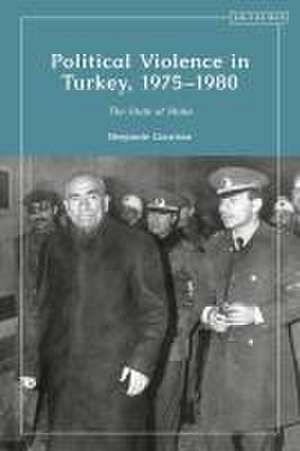Political Violence in Turkey, 1975-1980: The State at Stake: Contemporary Turkey
Autor Benjamin Gourisseen Limba Engleză Paperback – 18 sep 2024
| Toate formatele și edițiile | Preț | Express |
|---|---|---|
| Paperback (1) | 191.22 lei 22-36 zile | +70.80 lei 5-11 zile |
| Bloomsbury Publishing – 18 sep 2024 | 191.22 lei 22-36 zile | +70.80 lei 5-11 zile |
| Hardback (1) | 510.42 lei 43-57 zile | |
| Bloomsbury Publishing – 22 mar 2023 | 510.42 lei 43-57 zile |
Preț: 191.22 lei
Preț vechi: 249.30 lei
-23% Nou
Puncte Express: 287
Preț estimativ în valută:
36.59€ • 38.31$ • 30.28£
36.59€ • 38.31$ • 30.28£
Carte disponibilă
Livrare economică 17-31 martie
Livrare express 28 februarie-06 martie pentru 80.79 lei
Preluare comenzi: 021 569.72.76
Specificații
ISBN-13: 9780755646432
ISBN-10: 0755646436
Pagini: 232
Dimensiuni: 156 x 234 x 25 mm
Greutate: 0.33 kg
Editura: Bloomsbury Publishing
Colecția I.B.Tauris
Seria Contemporary Turkey
Locul publicării:London, United Kingdom
ISBN-10: 0755646436
Pagini: 232
Dimensiuni: 156 x 234 x 25 mm
Greutate: 0.33 kg
Editura: Bloomsbury Publishing
Colecția I.B.Tauris
Seria Contemporary Turkey
Locul publicării:London, United Kingdom
Caracteristici
A detailed reappraisal of the conditions which led to the 1980 coup, including the strength of nationalist forces and their success in penetrating key state institutions
Notă biografică
Benjamin Gourisse is Professor of Political Science at Sciences Po Toulouse, France. His research focuses on the political sociology of contemporary Turkey, including state sociology, political parties, the armed forces, and state-society relations. He co-edited Order and Compromise. Government Practices in Turkey from the Late Ottoman Empire to the Early 21st Century (2015) and is the author of numerous peer-reviewed journal articles.
Cuprins
Acronyms and AbbreviationsIntroductionInterpretations of the Turkish crisisThe supposed symmetry in actors' positions and resourcesThe supposed autonomization of violenceThe State supposedly knocked out of playQuestions and hypothesesPlan of the book 1. The State at stakeThe State's limited autonomySocio-economic transformations (1960-1980)The restructuring and deadlock of institutional politicsMaintaining order in practical terms 2. Movements in conflictThe radical leftThe nationalist far right 3. The accumulation and circulation of resourcesDissimilar economic ressourcesInstitutionnal fashioning and activist culturesPolitical identities and the uses to which they were put 4. Capturing resources and politicizing the StateAcceding to governement as a way to obtain State positionsPoliticizing institutions - the law and order sectorReplacing the public authorities 5. The spread of protest movementMobilizations specific to education sectorMulti-sector protest movements 6. The escalation in violenceThe timeframes of violent exchangesThe geographical distribution of violent interactionSocial profiles of the activists and victims Chapter 7. The effects of violence on political contestsActivities of physical violence and their benefitsThe uses and effects of violence - the Kahramanmaras massacreViolence as a means of legitimizing the military coup ConclusionOutline chronology of the events (1961-1980)Bibliography
Recenzii
This study is interesting for bringing out the flagrant gap in protagonists' resources. [.] In seeking to understand the reasons for the growing place violence came to acquire in the Turkish political field over this period, the author establishes points of comparison with the Weimar Republic. For him, it is a matter of questioning the Turkish state's pretended neutrality during this troubled period. [.] This fascinating study is obligatory reading, feeding the imaginary of the "deep state". The book sets out to be a precious key for deciphering the bitter, behind-the-scenes struggle currently being waged between partisans of "Super President" Recep Tayyip Erdogan and supporters of the Fethullah Gülen neo-brotherhood.
This book is a very well conducted study of a specific period in Turkey's political evolution, which led, on 12 September 1980, to a coup, a rewriting of the constitution, and an overhaul of institutions, which are still ongoing, and have, in a slew of recent elections, become a topic of passionate debate.
This book is a very well conducted study of a specific period in Turkey's political evolution, which led, on 12 September 1980, to a coup, a rewriting of the constitution, and an overhaul of institutions, which are still ongoing, and have, in a slew of recent elections, become a topic of passionate debate.







